
Micheline Presle was a French actress. She was sometimes billed as Micheline Prelle. Starting her career in 1937, she starred in over 50 films, appearing firstly in productions in her native France and also in Hollywood during the era of Classical Hollywood Cinema. Subsequently she returned to French films from the mid-1960s until 2014.

Against All Flags is a 1952 American pirate film directed by George Sherman, with uncredited assist from Douglas Sirk. It features Errol Flynn as Lt. Brian Hawke, Maureen O'Hara as Prudence "Spitfire" Stevens, and Anthony Quinn as Roc Brasiliano. The film is set in 1700, on the coast of Madagascar.

Gentleman Jim is a 1942 film directed by Raoul Walsh and starring Errol Flynn as heavyweight boxing champion James J. Corbett (1866–1933). The supporting cast includes Alexis Smith, Jack Carson, Alan Hale, William Frawley, and Ward Bond as John L. Sullivan. The movie was based upon Corbett's 1894 autobiography, The Roar of the Crowd. The role was one of Flynn's favorites.

Adventures of Don Juan is a 1948 American Technicolor swashbuckling adventure romance film directed by Vincent Sherman and starring Errol Flynn and Viveca Lindfors, with Robert Douglas, Alan Hale, Ann Rutherford, and Robert Warwick. Also in the cast are Barbara Bates, Raymond Burr, and Mary Stuart. The film was distributed by Warner Bros. and produced by Jerry Wald. The screenplay by George Oppenheimer and Harry Kurnitz, based on a story by Herbert Dalmas, has uncredited contributions by William Faulkner and Robert Florey.

The Sisters is a 1938 American drama film produced and directed by Anatole Litvak and starring Errol Flynn and Bette Davis. The screenplay by Milton Krims is based on the 1937 novel of the same title by Myron Brinig.

The film appearances of movie actor Errol Flynn (1909–1959) are listed here, including his short films and one unfinished feature.

That Forsyte Woman is a 1949 American romantic drama film directed by Compton Bennett and starring Greer Garson, Errol Flynn, Walter Pidgeon, Robert Young and Janet Leigh. It is an adaptation of the 1906 novel The Man of Property, the first book in The Forsyte Saga by John Galsworthy.
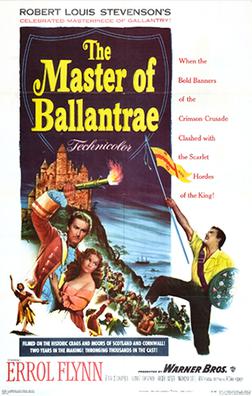
The Master of Ballantrae is a 1953 British Technicolor adventure film starring Errol Flynn and Roger Livesey. It is a loose and highly truncated adaptation of the Robert Louis Stevenson 1889 novel of the same name. In eighteenth century Scotland, two sons of a laird clash over the family estate and a lady. It was the last film directed by William Keighley.

The Case of the Curious Bride is a 1935 American mystery film, the second in a series of four starring Warren William as Perry Mason, following The Case of the Howling Dog. The script was based on the 1934 novel of the same name by Erle Stanley Gardner, published by William Morrow and Company, which proved to be one of the most popular of all the Perry Mason novels.

Footsteps in the Dark is a light-hearted 1941 mystery film, starring Errol Flynn as an amateur detective investigating a murder.
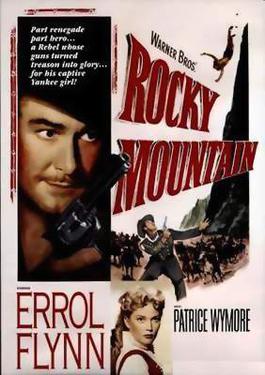
Rocky Mountain is a 1950 American Western film directed by William Keighley and starring Errol Flynn. It also stars Patrice Wymore, who married Flynn in 1950. The film is set in California near the end of the American Civil War.

Cry Wolf is a 1947 American mystery film noir directed by Peter Godfrey and starring Errol Flynn, Barbara Stanwyck and Geraldine Brooks. It was produced and distributed by Warner Bros. It is based on the 1945 novel of the same name by Marjorie Carleton.
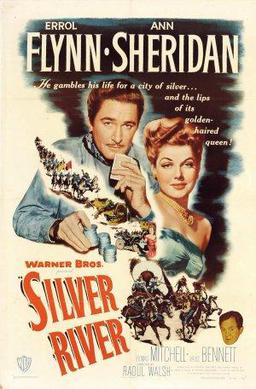
Silver River is a 1948 American western film directed by Raoul Walsh and starring Errol Flynn, Ann Sheridan and Thomas Mitchell. The film is based on a Stephen Longstreet story that was turned into a novel. It was produced and distributed by Warner Bros.

Lydia Bailey is a 1952 American historical adventure film directed by Jean Negulesco and starring Dale Robertson, Anne Francis and Charles Korvin. It was made by 20th Century Fox and based on the 1947 novel of the same name by Kenneth Roberts.

Don't Bet on Blondes is a 1935 American romantic comedy film.
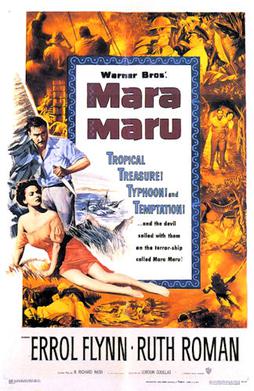
Mara Maru is a 1952 American noir action film starring Errol Flynn, Ruth Roman and Raymond Burr. Directed by Gordon Douglas, it was the last movie Flynn made for Warner Bros where he had started out in Hollywood in 1935.

Montana is a 1950 American Western film directed by Ray Enright and starring Errol Flynn. It was only the second time Flynn played an Australian on screen, the first time being Desperate Journey (1942).
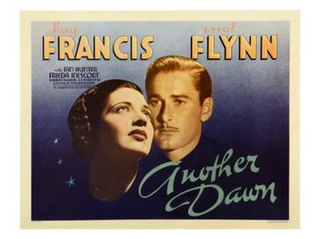
Another Dawn is a 1937 American melodrama film directed by William Dieterle and starring Errol Flynn, Kay Francis and Ian Hunter. It is based on Somerset Maugham's 1919 play Caesar's Wife. It was produced and distributed by Warner Brothers. The film received dismissive reviews.

Crossed Swords or The Teacher of Don Juan is a 1954 historical swashbuckling adventure film directed by Milton Krims and starring Errol Flynn, Gina Lollobrigida and Nadia Gray. It was co-production between Italy and the United States. It was shot at the Cinecittà Studios in Rome. The film's sets were designed by the art director Arrigo Equini.

Last of the Buccaneers is a 1950 American Technicolor adventure film directed by Lew Landers and starring Paul Henreid as Jean Lafitte.



















